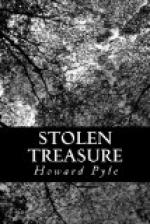And all the while Tom Chist sat and listened, every now and then reaching out furtively and touching the heap of money still lying upon the coat.
One might be inclined to wonder why Captain Kidd had kept those bloody records. He had probably laid them away because they so incriminated many of the great people of the colony of New York that, with the books in evidence, it would have been impossible to bring the pirate to justice without dragging a dozen or more fine gentlemen into the dock along with him. If he could have kept them in his own possession, they would doubtless have been a great weapon of defence to protect him from the gallows. Indeed, when Captain Kidd was finally brought to conviction and hung, he was not accused of his piracies, but of striking a mutinous seaman upon the head with a bucket and accidentally killing him. The authorities did not dare try him for piracy. He was really hung because he was a pirate, and we know that it was the log-books that Tom Chist brought to New York that did the business for him; he was accused and convicted of manslaughter for killing of his own ship-carpenter with a bucket.
So Parson Jones, sitting there in the slanting light, read through these terrible records of piracy, and Tom, with the pile of gold and silver money beside him, sat and listened to him.
What a spectacle, if any one had come upon them! But they were alone, with the vast arch of sky empty above them and the wide white stretch of sand a desert around them. The sun sank lower and lower, until there was only time to glance through the other papers in the chest.
They were nearly all goldsmiths’ bills of exchange drawn in favor of certain of the most prominent merchants of New York. Parson Jones, as he read over the names, knew of nearly all the gentlemen by hearsay. Aye, here was this gentleman; he thought that name would be among ’em. What? Here is Mr. So-and-so. Well, if all they say is true, the villain has robbed one of his own best friends. “I wonder,” he said, “why the wretch should have hidden these papers so carefully away with the other treasures, for they could do him no good?” Then, answering his own question: “Like enough because these will give him a hold over the gentlemen to whom they are drawn so that he can make a good bargain for his own neck before he gives the bills back to their owners. I tell you what it is, Tom,” he continued, “it is you yourself shall go to New York and bargain for the return of these papers. ’Twill be as good as another fortune to you.”
The majority of the bills were drawn in favor of one Richard Chillingsworth, Esquire. “And he is,” said Parson Jones; “one of the richest men in the province of New York. You shall go to him with the news of what we have found.”
“When shall I go?” said Tom Chist.
“You shall go upon the very first boat we can catch,” said the Parson. He had turned, still holding the bills in his hand, and was now fingering over the pile of money that yet lay tumbled out upon the coat. “I wonder, Tom,” said he, “if you could spare me a score or so of these doubloons?”




